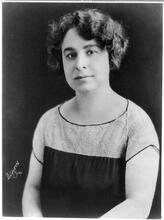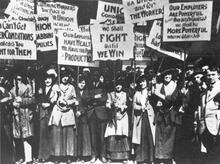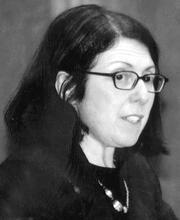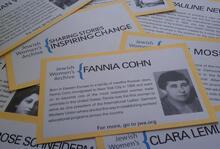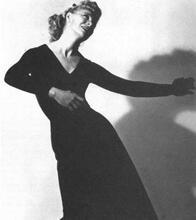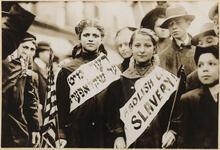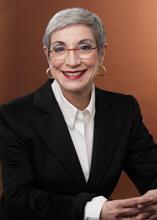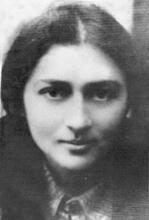Sara Szweber
Born in 1875 in Brest, Belarus, Sara Szweber was raised by her aunt after the untimely death of her parents. Independent and precocious, Szweber entered the dressmaking and tailoring business at a young age, catering to elite Jewish clients. She employed democratic principles in her store, inspired by Russian writer Nikolai Chernishevski: all employees were paid the same wage and worked eight-hour days. Szweber soon joined the Jewish socialist party, the Bund. She later moved to Poland, where she held many leadership positions within the Bund party. After the outbreak of World War II in 1939, she fled to the United States. In New York, she worked again as a dress maker and was an active member of the American office of the Bund.
Early Life
Sara Szweber was born Pesl Katelianski in Brest (Belarus) on the Bug river circa 1875. In the 1920s and 1930s, she was one of the few women members of the governing bodies of the Jewish labor party Bund and the Bund-dominated Jewish trade union movement. Like the history of the Bund, her political biography was divided into a phase of illegal activities in the Russian Empire and one of work within a legally recognized party and trade union movement in the Second Polish Republic. The latter phase was followed in 1939 by emigration to the United States.
Sara Szweber’s family had once been well-to-do, but became increasingly impoverished during her childhood. After the early death of both of her parents, she was raised by an aunt. At a young age she developed a strong desire for independence, which led her not only to study on her own but also to undertake an apprenticeship as a ladies’ tailor. In her home city of Brest, which was also an important Russian garrison town, she opened her own dressmaking shop, which enjoyed a high reputation among the local wives of officers and civil servants and the wealthy Jewish bourgeoisie. As a contemporary (Berl Katelianski) recalled, the young dressmaker, already “a legend” in Brest, organized her workshop along the democratic principles that the Russian writer and journalist Nikolai Chernishevski (1828–1899) had described in his novel What Is To Be Done? (1863) using the example of a dressmakers’ cooperative: all employees received the same wages and worked an eight-hour day.
The Bund
Sara Szweber (also known as “black Pesl”) joined the Bund, which was already quite strong in Brest, around 1900, participating in illegal meetings and workers’ educational circles. The end of her double life as the owner of a shop for rich ladies and a revolutionary came with her arrest in 1903 on the occasion of a celebration of the anniversary of the Bund’s founding. After her release Szweber was active in a number of towns, mainly in the underground. During the Revolution of 1905, she headed a Polish-Jewish demonstration in the Polish provincial city of Kalisz and for the first time tested her talents as an orator before a larger audience. After the crushing of the revolution, Szweber moved first to Lublin and then to Lodz, where she was arrested for the second time. After a hunger strike, now ill with tuberculosis, she was released on bail and escaped to Galicia where she lived until the end of World War I. There she met her future husband Elijahu Szweber, a member of the Jewish Social Democratic Party in Galicia (also known as the Galician Bund).
In 1918 Sara Szweber moved to Warsaw, where she lived and worked until the outbreak of World War II, earning her living as a trade union official and general secretary of the garment workers’ union, which had both Polish and Jewish members. At the same time, as a member of the so-called Landrat, she headed the Jewish trade unions together with Victor Alter (1890–1941). With some one hundred thousand members, the Jewish trade union organization, in which the Bund dominated, was the largest Jewish mass-membership organization in Poland in the 1930s. Sara Szweber was actively involved in the deliberations of the various executive committees and co-authored numerous trade union memoranda. She was especially dedicated to further training for workers.
Political Leadership
Within the Bund, Sara Szweber belonged to the leftist faction of the Tsveyer, who advocated a revolutionary Marxist course. In the early 1920s the Tsveyer still had a slight majority within the party, but then had to relinquish this to the moderate group of the Eynser. Szweber’s authority as a longtime party member combined with her political acuity to make her an important link between the various inner-party groupings. She held leading positions in party executive bodies. Thus for example she belonged to the executive of the largest local party organization in Warsaw and was a member of the party central committee. In 1938 she was one of a seventeen-member Bund faction that entered the Warsaw city council after the municipal elections. Here, too, she continued to focus her energies on social programs on behalf of Jewish workers.
Like many other Bundists, Sara Szweber fled to the east after the outbreak of World War II, first to her home city of Brest. However, as a prominent member of the Jewish labor party, she faced arrest by the Soviet secret police and in 1941 finally succeeded in fleeing via Vilna to the United States. She spent the last two decades of her life as an emigrée in New York, where she once again worked as a dressmaker. She remained an active member of the Bund, working in the American central office, and in 1965, when she was already about ninety years old, she participated in the Bund’s fourth World Congress. She died in New York on March 2, 1966.
As a female counterpart to Victor Alter, the charismatic Bund leader, Sara Szweber personified the symbiotic combination of political activism and professional engagement that was so very important for the Bund. Her early practical experience as the head of a cooperatively organized dressmaking workshop predestined her for her later work as a union leader. This gave her an almost unique status among the women of the legally operating party of the interwar period.
Blatman, Daniel. “Women in the Jewish Labor Bund in Interwar Poland.” In Women in the Holocaust, edited by Dalia Ofer and Leonore Weitzman, 68–84. New Haven and London: 1998.
Fieseler, Beate. “The Jewish Legacy and Social Democracy. Women in the Bund and the Russian Social Democratic Workers’ Party at the Turn of the Century.” In Bund—100 Years of History. 1897–1997, edited by Feliks Tych and Juergen Hensel, 187–199 (Polish). Warsaw: 2000.
Hertz, J.S., ed. Generations of Bundists (Yiddish). Vol. 3. New York: Privat, 1981, 75–79.
Pickhan, Gertrud. Gegen den Strom. Der Allgemeine Jüdische Arbeiterbund “Bund” in Polen 1918–1939. Schriften des Simon-Dubnow-Instituts, I. Stuttgart, Munich: Deutsche Verlags-Anstalt, 2001.
Obituaries: Unzer Tsayt, 1966, 3–4, 19–27; Forverts, 12.4.1966.

